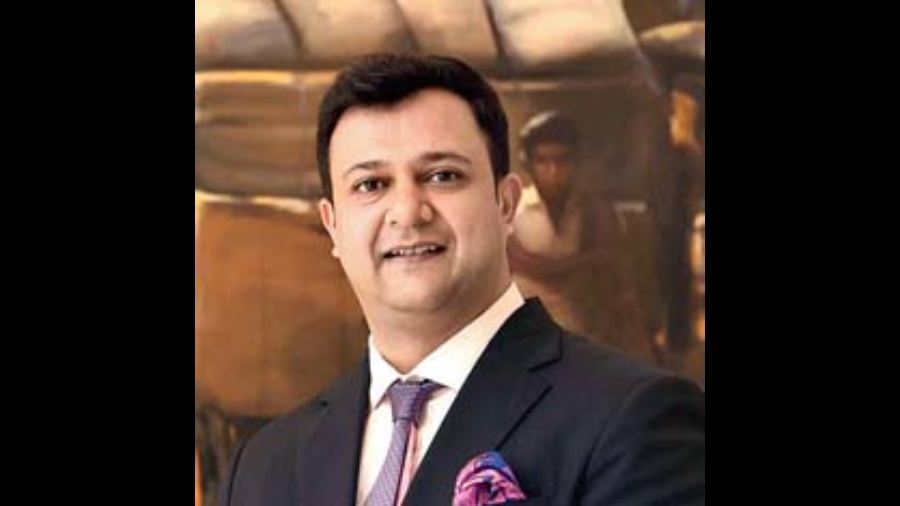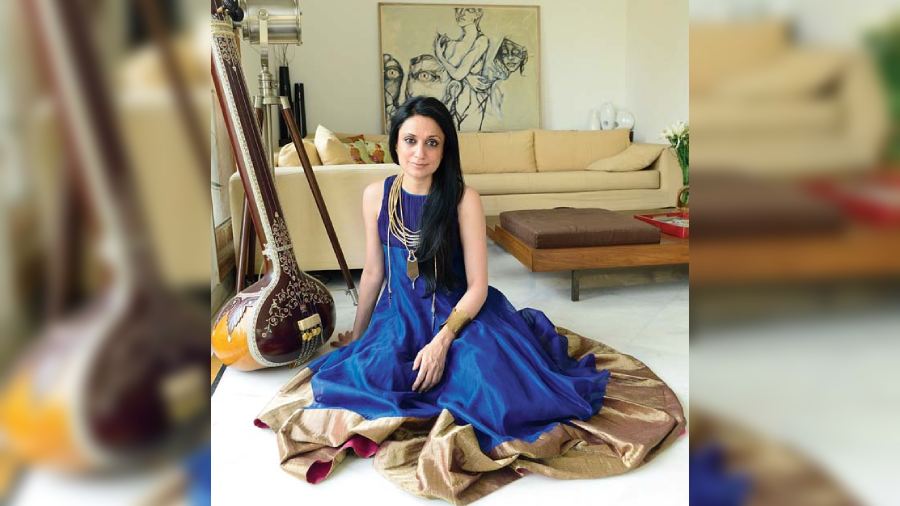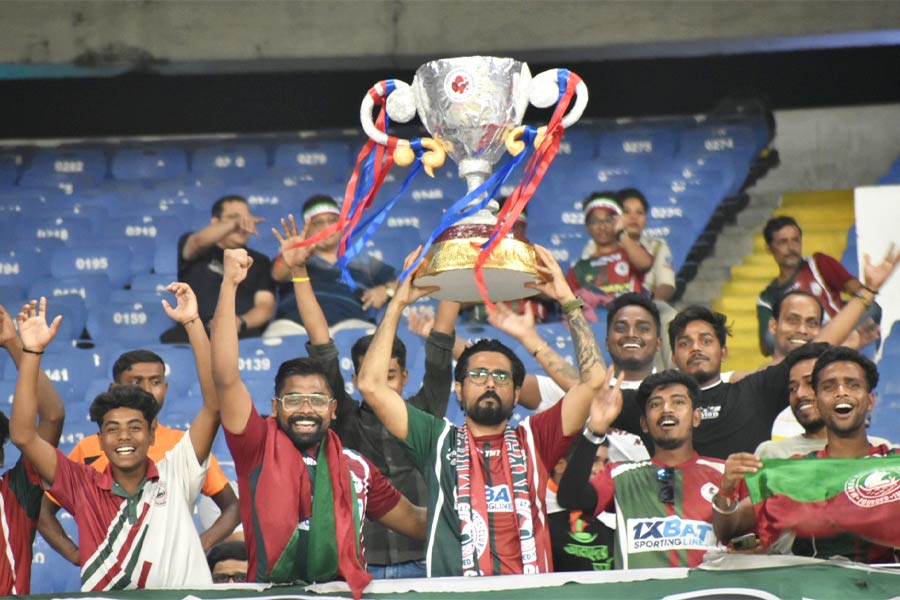ITC Hotels is celebrating Sufi Music with award-winning singer and songwriter Sonam Kalra, in association with ZOYA on September 10 at ITC Royal Bengal. The invite-only evening will see the singer sing soulful songs. Ahead of her performance, The Telegraph chatted with the talented musician on everything music.
Do you have any special memories of Calcutta?
I have memories of spending a few childhood summers in Calcutta. My grandfather, Lt Genl. J S Aurora, hero of the Bangladesh war, was the head of the eastern command and was stationed in Calcutta in the Command House so we used to come in the summer.
For the uninitiated, tell us about The Sufi Gospel Project and how it happened?
The Sufi Gospel Project is an attempt to blend the many voices of faith and create one universal voice of faith. It is an attempt, through music, to break down the walls that separate us. Sufism means an acceptance of all humanity as equal and so I felt that I must create a sound that encompasses many different faiths and ideologies. Even though I trained in Indian classical music, I had been singing Gospel music for a year or so before this project was born. The one thing almost everyone asked me at the end of a concert was, ‘Why does a Sikh girl sing Gospel music (or ‘Christian bhajans’ as someone referred to them)? My answer to them as always the same, ‘God has no religion and religion is not God.’
The idea for The Sufi Gospel Project was born when I was asked to sing Gospel music at the Urz, the birth celebration, of the Sufi saint Inayat Khan in Nizamuddin. That was a turning point in my life, the very thought of a Sikh girl singing Gospel, Christian music, in a seemingly Islamic space was so very special for me; it felt like the universe was telling me something. And so, I worked on trying to create something worthy, something befitting of this opportunity that had been granted to me.
The Sufi Gospel Project blends together the many voices of faith, through poetry, prayer and music to create one universal voice of faith. Traditional Western Gospels meld with Indian classical sounds and Indian spiritual texts are enriched by elements of Western poetry to create a sound that touches every soul. To put forth the idea that no matter what the language of the lyrics or the ethnicity of the sounds is, there is but one language, the language of faith.. In my music, Khusrau blends with Amazing Grace, Kabir shares the stage with Abide with Me and Bulleh Shah’s voice is heard amidst English texts and Irish music whilst Nanak’s words resonate in the plaintive strains of world folk sounds. The aim of The Sufi Gospel Project is to shed the garb of traditional Sufi and Gospel interpretations, to find a common ground between them and take on a more all-inclusive definition of Oneness that also embraces Bhakti, contemporary poetry and more.
Because of the many languages and musical influences I’ve combined, I find that most people are able to connect with the music and the message. That of true Sufism: an acceptance of all truths. Yours, mine, his, hers, everyone’s truth as equal.
What can people expect from your performance at ITC Royal Bengal?
They can expect to delve into a deeper understanding of the true meaning of Sufism where the mystic poetry of Sufi mystic poets like Kabir, Bulleh Shah, Amir Khusrau and Zaheen Shah Taji are presented to highlight the one absolute truth that God is within. Where prayer and poetry from different languages and religions come together to create a sound that touches every soul. Where the call to Allah finds resonance in the Sikh morning prayer, where India classical sounds seamlessly flow into western accompaniment and where the lines between religions are blurred through the beauty of note and music.
Were there any musical influences while growing up?
For as long as I can remember there has always been music in our house. I remember sitting on my mother’s lap listening to Begum Akhtar. There was a certain calm, a surrender almost, a deep emotion that would be apparent on my mother’s face when she listened to music and she made sure I was exposed to all kinds of music.
I always loved music and my mother used to tell me that I was always singing, even as a child. Hence, I started learning as a child and then as I grew older, I was fortunate enough to learn Indian classical music from teachers anyone else would’ve given their right arm to learn from.
In college, I took a break from music and went to art school and focussed on design. I then joined advertising as a writer and graphic designer and worked there for quite a few years but eventually found my way back to music. And I think that was because it was then that I felt I had something to say through my music and that was when my musical style and journey really started to take shape.
Music connects with the soul and is a healer. What is it that you look for when composing?
Music to me is worship, ibaadat, and it moves me from deep within. And yes, it is the greatest healer and best companion. I love beautiful poetry, I need to be moved by the beauty of the lyrics before I compose. They need to resonate to the core of my personal belief. When I compose it’s quite an immersive process and I tend to lose myself in the creative journey. I’m also a perfectionist so I like to go over things with a fine-toothed comb. The composition takes a while to develop, and is constantly fine-tuned till it takes its final avatar.
You were one of the chosen Indian singers for the Recording Academy as a voting member of the Grammy! How did it happen?
Yes, getting that invitation to become a part of the Recording Academy was one of the best feelings ever. I remember tears rolling down my face when I got the news because I was so thrilled and moved at the same time. It’s extremely special because you are peer reviewed, which means experts in the global music community review your work and decide if you are a worthy addition to the Grammy Recording Academy, hence it feels even more special.
Right now with so many accolades, recognition, fame and success… what still inspires you to keep going and achieving different heights?
Honestly, I just feel like I have so much more to do, so much more that I have to create and get better at, that it drives me to work harder. I think one has to keep one’s head down and focus on the goal and not be distracted by all the other stuff. As Rumi said, ‘I want to sing like the birds sing, not worrying about who hears or what they think’.
You’ve also created a very moving multi-disciplinary performance on the Partition of India, called Partition: Stories of Separation By Sonam Kalra, tell us about that.
Partition: Stories of Separation is an experiential performance using music, theatre, video and design to retell the stories of separation as a result of the Partition of India in 1947. Ever since I was a young girl, I’ve heard stories about the Partition. Both sides of my family came from the part of Punjab that is now in Pakistan. My mother’s family was from Rawalpindi and my father’s from Sargoda. Even though I did not have to live through the pain of Partition myself, I have always been moved to tears when talking about it with someone.
It is now 75 years since the Partition and therefore even more pertinent to revisit this cataclysmic event that changed the future of these two countries forever. This is the reason I decided to explore what the Partition meant, using the language of music. Many of the stories we heard from our grandparents will be lost with the passing of the older generation and they need to be preserved, honoured and to serve as lessons for generations to come. I hope that in revisiting these stories through music and theatre, we are able to empathise, ponder and realise the way forward.
I spent two years researching the works of poets and writers from both sides and composed the music for this performance based on their poetry and inspired by their stories. I also worked with a contemporary poet, Deepak Ramola, whose poetry is recited during the show and with whom I have co-written one of the pieces. Using the power of music, the voices of Ali Sardar Jafri, Daman, Faiz Ahmad Faiz and Amrita Pritam as well as personal accounts of ordinary people who survived this terrible ordeal, my effort has been to weave together a retelling of this holocaust that tore our country apart.
Quick Q&A
Artistes you love listening to: Abida Parveen, Nusrat Fateh Ali Khan, Kumar Gandharva, Shobha Gurtu, Begum Akhtar, Farida Khanum, Ella Fitzgerald, Frank Sinatra and Leonard Cohen are my favourites.
Band or musician you would love to collaborate with: Abida Parveen ji.
Music is: Life, it is breath, it is worship, it is ibaadat to me.
Best performing venue: Sydney Opera House and MTV Coke Studio. I've been truly fortunate to be able to share my music at some very special venues in 30 countries across the world, including the iconic Sydney Opera House, The Pyramids of Giza, The Royal Opera House Cairo, Coke Studio India, Muzaffar Ali’s Jahan-E-Khusrau with Abida Parveen and The Sounds of Freedom Concert in New Delhi where I shared the stage with legendary musician Sir Bob Geldof.
Dream venues: Royal Albert Hall, Kennedy Centre.
My all-time favourite songs: Main Sufi hoon sarmasta (Abida Parveen) Amazing Grace, Hallelujah.
An instrument you would like to learn: The piano.

In keeping with the ITC Hotels’ ethos of Responsible Luxury, ITC Royal Bengal is committed to the promotion of the arts. It is our continuous endeavour to elevate and enhance the guest experience not only through our superlative product, services and food and beverage offerings but also through discerning events for the people of this charming city who have always appreciated the finer things in life — Gaurav Soneja, general manager, ITC Royal Bengal






